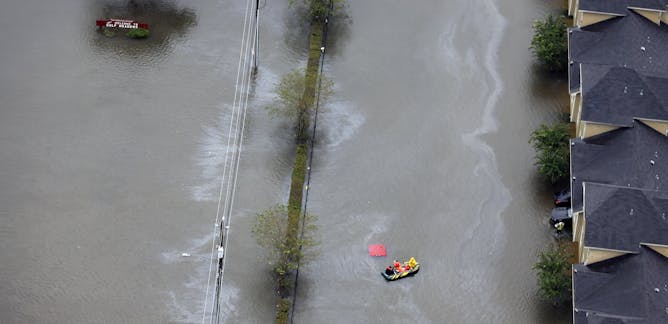
Artikel-artikel mengenai Sustainability
Menampilkan 401 - 420 dari 695 artikel

It’s not just about rebuilding infrastructure after storms: Cities need to systematically rethink their knowledge systems which are at the heart of urban resilience.

In cities dominated by globalised market forces, how can we achieve social equity and justice? For any sharing economy idea, we need to ask what will it do to fix the big problems confronting us all.

The world’s population has reached 8 billion and is expected to climb to nearly 10 billion by 2050. Why will population growth inevitably continue? Should we try to reduce or stop this growth?

To fix the world’s ecological crises we’ll have to make some tough choices, particularly living with less stuff. Art can play an essential role in imagining and communicating a more sustainable future.

Victoria’s proposed ban on single-use plastic bags is a step forward, but what about all the other unnecessary packaging? A truly effective waste policy should offer a comprehensive plan for packaging.

Huge hunks of meat and energy inefficient cooking methods make the Sunday roast a particularly unsustainable meal.

Choreographers could offer engineers tools to stimulate new ideas in city-making.

The law says that newly built houses should have a six-star energy rating, to help residents afford their heating and cooling bills. But some builders seem to be findings ways around this requirement.

Our behaviour is far more selfish than we might like to believe.

New South Wales is the only state that has made meaningful progress on legislation and enforcement of standards capable of creating a sustainable built environment.

New research has found a marked increase in people, particularly among women over 50, who are building or want to build a tiny house. However, inflexible planning rules often stand in their way.

Its been 13 years since Mauritius introduced codes of corporate governance for listed companies with mixed results. Its experience is useful for other developing countries looking to do the same.

After extreme weather events like Hurricane Harvey, city planners need to think about the smartest way to rebuild. Here are some no-regrets infrastructure investment ideas.

Overuse of sand for construction and industry is harming the environment and fueling violence around the world. Scientists explain why we need international rules to regulate sand mining and use.

Universities can contribute to the goals through education, research, innovation and leadership, but they need to get started now.

The 17 Sustainable Development Goals have distinct functions but are interrelated and requires an integrated approach from both scientists and policymakers.

The rise of the middle class in Africa is fuelling consumer economies and protection policies. But they tend to be disconnected from sustainability issues.

Australia is good at ‘hard hat’ responses to crises such as cyclones. But a new environmental declaration on the Pacific Islands points out that the best approach is more well-rounded and subtle.

Why keep buying and chucking when you can rent and return?

The finance industry has developed a powerful set of tools over the years, which could be used to improve well-being and solve our environmental problems.
